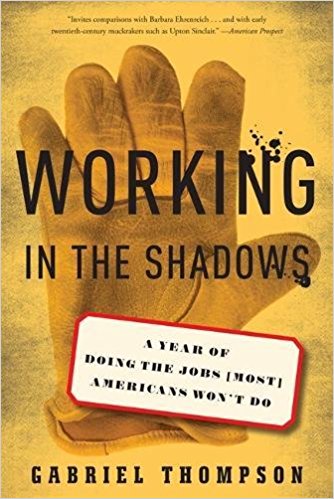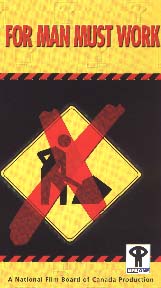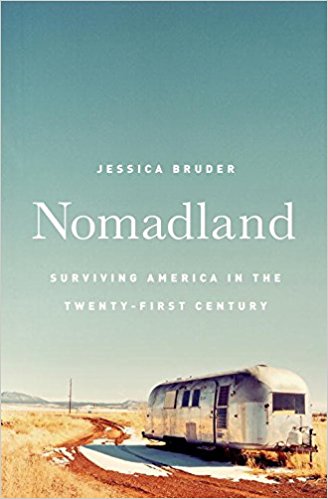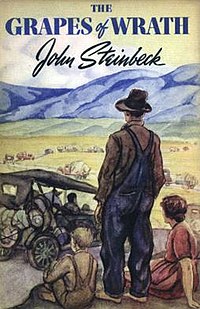by Christian Boyles
Nomadland: Surviving America in the Twenty-First Century
HD6280 .B77 2017
About the book
From the beet fields of North Dakota to the National Forest campgrounds of California to Amazon’s CamperForce program in Texas, employers have discovered a new, low-cost labor pool, made up largely of transient older Americans. Finding that social security comes up short, often underwater on mortgages, these invisible casualties of the Great Recession have taken to the road by the tens of thousands in late-model RVs, travel trailers, and vans, forming a growing community of nomads: migrant laborers who call themselves “workampers.”
On frequently traveled routes between seasonal jobs, Jessica Bruder meets people from all walks of life: a former professor, a McDonald’s vice president, a minister, a college administrator, and a motorcycle cop, among many others―including her irrepressible protagonist, a onetime cocktail waitress, Home Depot clerk, and general contractor named Linda May.
In a secondhand vehicle she christens “Van Halen,” Bruder hits the road to get to know her subjects more intimately. Accompanying Linda May and others from campground toilet cleaning to warehouse product scanning to desert reunions, then moving on to the dangerous work of beet harvesting, Bruder tells a compelling, eye-opening tale of the dark underbelly of the American economy―one that foreshadows the precarious future that may await many more of us. At the same time, she celebrates the exceptional resilience and creativity of these quintessential Americans who have given up ordinary rootedness to survive. Like Linda May, who dreams of finding land on whichto build her own sustainable “Earthship” home, they have not given up hope.
Is it checked out? Don’t worry about it. Here are some other titles on the subject.
Grapes of Wrath | PS3537 .T3234 G8 1986
First published in 1939, Steinbeck’s Pulitzer Prize-winning epic of the Great Depression chronicles the Dust Bowl migration of the 1930s and tells the story of one Oklahoma farm family, the Joads—driven from their homestead and forced to travel west to the promised land of California. Out of their trials and their repeated collisions against the hard realities of an America divided into Haves and Have-Nots evolves a drama that is intensely human yet majestic in its scale and moral vision, elemental yet plainspoken, tragic but ultimately stirring in its human dignity. A portrait of the conflict between the powerful and the powerless, of one man’s fierce reaction to injustice, and of one woman’s stoical strength, the novel captures the horrors of the Great Depression and probes into the very nature of equality and justice in America. At once a naturalistic epic, captivity narrative, road novel, and transcendental gospel, Steinbeck’s powerful landmark novel is perhaps the most American of American Classics.
Working in the Shadows | HD6300 .T46 2010
 What is it like to do the back-breaking work of immigrants? To find out, Gabriel Thompson spent a year working alongside Latino immigrants, who initially thought he waseither crazy or an undercover immigrationagent. He stooped over lettuce fields in Arizona, and worked the graveyard shift at a chicken slaughterhouse in rural Alabama. He dodged taxis – not always successfully – as a bicycle delivery ”boy” for an upscale Manhattan restaurant, and was fired from a flower shop by a boss who, he quickly realized, was nuts. As one coworker explained, ”These jobs make you old quick.” Back spasms occasionally keep Thompson in bed, where he suffers recurring nightmares involving iceberg lettuce and chicken carcasses. Combining personal narrative with investigative reporting, Thompson shines a bright light on the underside of the American economy, exposing harsh working conditions, union busting, and lax government enforcement – while telling the stories of workers, undocumented immigrants, and desperate US citizens alike, forced to live with chronic pain in the pursuit of $8 an hour.
What is it like to do the back-breaking work of immigrants? To find out, Gabriel Thompson spent a year working alongside Latino immigrants, who initially thought he waseither crazy or an undercover immigrationagent. He stooped over lettuce fields in Arizona, and worked the graveyard shift at a chicken slaughterhouse in rural Alabama. He dodged taxis – not always successfully – as a bicycle delivery ”boy” for an upscale Manhattan restaurant, and was fired from a flower shop by a boss who, he quickly realized, was nuts. As one coworker explained, ”These jobs make you old quick.” Back spasms occasionally keep Thompson in bed, where he suffers recurring nightmares involving iceberg lettuce and chicken carcasses. Combining personal narrative with investigative reporting, Thompson shines a bright light on the underside of the American economy, exposing harsh working conditions, union busting, and lax government enforcement – while telling the stories of workers, undocumented immigrants, and desperate US citizens alike, forced to live with chronic pain in the pursuit of $8 an hour.
For Man Must Work | Streaming Film 
The 20th century saw the creation of colossal wealth and exploding economies, but the days of industry providing mass employment are over. We are moving from a mass labor force to an elite corps concentrated in the knowledge sector. Will this change result in a sort of economic apartheid in which a third of humanity is made redundant? This film shows how the economic, living, and working situations are deteriorating for the people in Canada, France, and Mexico. Viewers also hear from experts such as Vivianne Forrester, author of The Economic Horror; Jeremy Rifkin, American economist and author of The End of Work; sociologist Ricardo Petrella; Ignacio Ramonet, editor in chief of Le Monde diplomatique; and Jacques Attali, author of Dictionary of the 21st Century and former president of the European Bank for Reconstruction and Development. They have no illusions – they think the 21st century is getting off to a very bad start


